Daughters Handling Disappointment

We all have moments when things don’t go as planned. However, for daughters who have fewer experiences to help her put things into perspective, being disappointed can seem unbearable. See how your daughter can develop coping skills that won’t end in disaster.
You can’t always prepare your daughter for what life has in store nor can you protect her from experiencing many of life’s disappointments. “Life is not always fair” I think is a fair comment that we’ve heard at some time in our life and yes it’s true. However, you can show your daughter how to accept disappointments, learn from them and move forward to acceptable outcomes.
If your daughter does not develop the skills needed to self-help, resolve her problems, and understand other’s feelings, she will be vulnerable to a host of other problems. These problems can include academic trouble, aggression, alcohol, drug use, depression and eating disorders.
You as the parent can help your daughter by rehearsing some strategies to handle disappointment before a potentially disappointing incident occurs. For example if she has other siblings and they all want to help doing the same thing – you can inform your daughter that you can only choose one person to help. Before you announce who will help, remind your daughter and siblings that although one will be selected – it might make you feel disappointed. Ask what she can do if she feels disappointed? You as the parent can suggest that she could say “Oh well, maybe next time”. This will encourage your daughter to think and feel better about who will be selected.
After you have selected the helper, for reinforcement you can mention that you really like how they remained calm and handled their disappointment. For further reinforcement, you can mention your project to your daughter’s teacher and she can use it during class time with other students. Her teacher can mention to her that she heard how she handled disappointment in a calm fashion at home and the teacher can also mention that she could demonstrate the new skill in class so that others may learn from it.
Together both parent and teacher can encourage and reinforce healthy coping skills. These skills will encourage not only your daughter but other children to calm themselves when they are upset, and show that they have the power to choose to be happy. Your daughter will fill a sense of self-fulfillment because she will be in control of her own feelings - her feelings won’t control her. In other words she will act out less and feel good about it.
Most disappointments in your daughter’s life will be small but they can prepare her to handle larger challenges later in life that can become a disaster. Help her self-soothe. Let her know that it’s okay to be disappointed - it’s how she handles that disappointment that makes a difference.
Helping daughter’s or other children with anger or disappointment earlier in life is important. Coping with anger or disappointment as a child or an adult can be a difficult task. Learning the right skills for coping will have to have everyone’s involvement – everyone pulling together as a team. This means you, me, a concerned person or a neighbor. If you don’t think it’s your problem - check the news.
Live, Laugh and Love
“Making a difference in the world one person at a time”
You can’t always prepare your daughter for what life has in store nor can you protect her from experiencing many of life’s disappointments. “Life is not always fair” I think is a fair comment that we’ve heard at some time in our life and yes it’s true. However, you can show your daughter how to accept disappointments, learn from them and move forward to acceptable outcomes.
If your daughter does not develop the skills needed to self-help, resolve her problems, and understand other’s feelings, she will be vulnerable to a host of other problems. These problems can include academic trouble, aggression, alcohol, drug use, depression and eating disorders.
You as the parent can help your daughter by rehearsing some strategies to handle disappointment before a potentially disappointing incident occurs. For example if she has other siblings and they all want to help doing the same thing – you can inform your daughter that you can only choose one person to help. Before you announce who will help, remind your daughter and siblings that although one will be selected – it might make you feel disappointed. Ask what she can do if she feels disappointed? You as the parent can suggest that she could say “Oh well, maybe next time”. This will encourage your daughter to think and feel better about who will be selected.
After you have selected the helper, for reinforcement you can mention that you really like how they remained calm and handled their disappointment. For further reinforcement, you can mention your project to your daughter’s teacher and she can use it during class time with other students. Her teacher can mention to her that she heard how she handled disappointment in a calm fashion at home and the teacher can also mention that she could demonstrate the new skill in class so that others may learn from it.
Together both parent and teacher can encourage and reinforce healthy coping skills. These skills will encourage not only your daughter but other children to calm themselves when they are upset, and show that they have the power to choose to be happy. Your daughter will fill a sense of self-fulfillment because she will be in control of her own feelings - her feelings won’t control her. In other words she will act out less and feel good about it.
Most disappointments in your daughter’s life will be small but they can prepare her to handle larger challenges later in life that can become a disaster. Help her self-soothe. Let her know that it’s okay to be disappointed - it’s how she handles that disappointment that makes a difference.
Helping daughter’s or other children with anger or disappointment earlier in life is important. Coping with anger or disappointment as a child or an adult can be a difficult task. Learning the right skills for coping will have to have everyone’s involvement – everyone pulling together as a team. This means you, me, a concerned person or a neighbor. If you don’t think it’s your problem - check the news.
Live, Laugh and Love
“Making a difference in the world one person at a time”

Related Articles
Editor's Picks Articles
Top Ten Articles
Previous Features
Site Map
Content copyright © 2023 by Tuculia Washington. All rights reserved.
This content was written by Tuculia Washington. If you wish to use this content in any manner, you need written permission. Contact Tuculia Washington for details.







